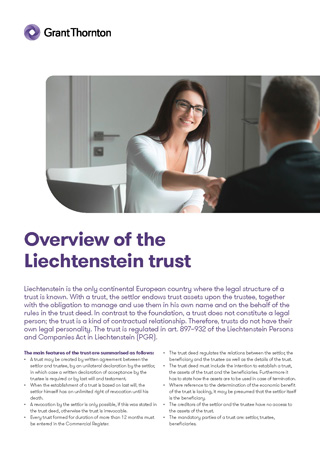Services
More security, more trust.
-
Audit Industry, Services, Institutions
More security, more trust: Audit services for national and international business clients
-
Audit Financial Services
More security, more trust: Audit services for banks and other financial companies
Competent advice on all national and international tax issues.
-
Corporate Tax
National and international tax consulting and planning
-
Individual Tax
Individual Tax
-
Indirect Tax/VAT
Our services in the area of value-added tax
-
Transfer Pricing
Our transfer pricing services.
-
M&A Tax
Advice throughout the transaction and deal cycle
-
Tax Financial Services
Our tax services for financial service providers.
Good advice makes things easier.
-
Advisory IT & Digitalisation
Generating security with IT.
-
Forensic Services
Nowadays, the investigation of criminal offences in companies increasingly involves digital data and entire IT systems.
-
Regulatory & Compliance Financial Services
Advisory services in financial market law and sustainable finance.
-
Mergers & Acquisitions / Transaction Services
Successfully handling transactions with good advice.
-
Legal Services
Experts in commercial law.
-
Trust Services
We are there for you.
-
Business Risk Services
Sustainable growth for your company.
-
IFRS Services
Die Rechnungslegung nach den International Financial Reporting Standards (IFRS) und die Finanzberichterstattung stehen ständig vor neuen Herausforderungen durch Gesetzgeber, Regulierungsbehörden und Gremien. Einige IFRS-Rechnungslegungsthemen sind so komplex, dass sie generell schwer zu handhaben sind.
External services that free up space for what is really important.
-
Abacus
Grant Thornton Switzerland Liechtenstein has been an official sales partner of Abacus Business Software since 2020.
-
Accounting Services
We keep accounts for you.
-
Payroll Services
Leave your payroll accounting to us.
-
Real Estate Management
Leave the management of your real estate to us.
With our unique culture and opportunities, our organisation is a place where you can grow. Wherever you are in your career, we help you to make a difference...
With us you will find a dynamic environment that supports your further growth and ambitions.
Launch your career with us!
-
Apprentices
Career with an apprenticeship?!
Job offers for experienced professionals.
Our treatment of your data and your rights
Information pursuant to Article 13 of the European General Data Protection Regulation (GDPR) and the Liechtenstein...
Vacancies

Liechtenstein is the only continental European country where the legal structure of a trust is known.
With a trust, the settlor endows trust assets upon the trustee, together with the obligation to manage and use them in his own name and on the behalf of the rules in the trust deed. In contrast to the foundation, a trust does not constitute a legal person; the trust is a kind of contractual relationship. Therefore, trusts do not have their own legal personality. The trust is regulated in art. 897–932 of the Liechtenstein Persons and Companies Act in Liechtenstein (PGR).
The main features of the trust are summarised as follows:
- A trust may be created by written agreement between the settlor and trustee, by an unilateral declaration by the settlor, in which case a written declaration of acceptance by the trustee is required or by last will and testament.
- When the establishment of a trust is based on last will, the settlor himself has an unlimited right of revocation until his death.
- A revocation by the settlor is only possible, if this was stated in the trust deed, otherwise the trust is irrevocable.
- Every trust formed for duration of more than 12 months must be entered in the Commercial Register.
- The trust deed regulates the relations between the settlor, the beneficiary and the trustee as well as the details of the trust.
- The trust deed must include the intention to establish a trust, the assets of the trust and the beneficiaries. Furthermore it has to state how the assets are to be used in case of termination.
- Where reference to the determination of the economic benefit of the trust is lacking, it may be presumed that the settlor itself is the beneficiary.
- The creditors of the settlor and the trustee have no access to the assets of the trust.
- The mandatory parties of a trust are: settlor, trustee, beneficiaries. The settlor can be an individual or a legal entity.
- At least one trustee must hold a professional trustee’s licence. The trustee manages the assets of the settlor according to the trust deed in his own name as an independent legal owner with effect to any possible individual.
- The trustee has to set up a list of assets and update it annually.
- The trustee is obliged to submit annual accounts to the auditors, if any, and otherwise to the settlor and the beneficiaries, if the trust deed does not contain different rules.
- The trustee is entitled to a fair remuneration and reimbursement of all necessary expenses.
- The trustee is personally liable to the settlor to the full extent of his own assets.
- The trustee has to manage the assets with the care due from a prudent businessman in complete conformity with the trust deed.
- The settlor, individuals or legal entities and the trustee can be beneficiaries. The trustee may not be the sole beneficiary.
- If the trust carries on a business run on commercial principles or its statutory purpose permits this, it is mandatory to appoint an auditor. In this case, the annual account, examined by the auditor, must be submitted to the Liechtenstein tax administration.
- The assets of a trust can legally be undertaken to bankruptcy.
- The trust is generally terminated according to the regulations in the trust deed.
- Taxation: Trusts have no legal personality and therefore are not subject to ordinary corporate income tax. If their seat or place of effective management is in Liechtenstein, they have to pay the annual minimum corporate income of CHF 1’800.


